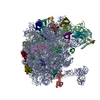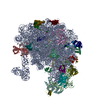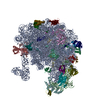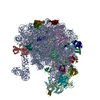+検索条件
-Structure paper
| タイトル | Multimodal binding and inhibition of bacterial ribosomes by the antimicrobial peptides Api137 and Api88. |
|---|---|
| ジャーナル・号・ページ | Nat Commun, Vol. 15, Issue 1, Page 3945, Year 2024 |
| 掲載日 | 2024年5月10日 |
 著者 著者 | Simon M Lauer / Maren Reepmeyer / Ole Berendes / Dorota Klepacki / Jakob Gasse / Sara Gabrielli / Helmut Grubmüller / Lars V Bock / Andor Krizsan / Rainer Nikolay / Christian M T Spahn / Ralf Hoffmann /   |
| PubMed 要旨 | Proline-rich antimicrobial peptides (PrAMPs) inhibit bacterial protein biosynthesis by binding to the polypeptide exit tunnel (PET) near the peptidyl transferase center. Api137, an optimized ...Proline-rich antimicrobial peptides (PrAMPs) inhibit bacterial protein biosynthesis by binding to the polypeptide exit tunnel (PET) near the peptidyl transferase center. Api137, an optimized derivative of honeybee PrAMP apidaecin, inhibits protein expression by trapping release factors (RFs), which interact with stop codons on ribosomes to terminate translation. This study uses cryo-EM, functional assays and molecular dynamic (MD) simulations to show that Api137 additionally occupies a second binding site near the exit of the PET and can repress translation independently of RF-trapping. Api88, a C-terminally amidated (-CONH) analog of Api137 (-COOH), binds to the same sites, occupies a third binding pocket and interferes with the translation process presumably without RF-trapping. In conclusion, apidaecin-derived PrAMPs inhibit bacterial ribosomes by multimodal mechanisms caused by minor structural changes and thus represent a promising pool for drug development efforts. |
 リンク リンク |  Nat Commun / Nat Commun /  PubMed:38730238 / PubMed:38730238 /  PubMed Central PubMed Central |
| 手法 | EM (単粒子) |
| 解像度 | 2.44 - 2.64 Å |
| 構造データ | EMDB-19426, PDB-8rpy: EMDB-19427, PDB-8rpz: EMDB-19428, PDB-8rq0: EMDB-19429, PDB-8rq2: |
| 由来 |
|
 キーワード キーワード | RIBOSOME / antimicrobial peptide / RNA / ribosomal protein / PrAMP / proline-rich peptide / antibiotics / 50S / Api137 / Api88 |
 ムービー
ムービー コントローラー
コントローラー 構造ビューア
構造ビューア 万見文献について
万見文献について













